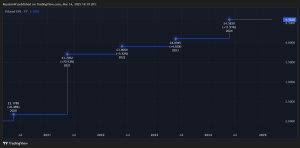The Securities and Exchange Commission issued a long-awaited report Monday on the decision by many stock brokers to restrict customers’ ability to purchase shares of GameStop Corp. and other meme stocks in January, but the document offers few clues about how the agency might change market-structure rules to prevent such incidents in the future and came to no definitive conclusions as to why those restrictions were made.
“January’s events gave us an opportunity to consider how we can further our efforts to make the equity markets as fair, orderly and efficient as possible,” SEC Chairman Gary Gensler said in a statement. “Making markets work for everyday investors gets to the heart of the SEC’s mission.”
The report offers an account of the rapid increase in the price of GameStop
GME,
shares in January of this year, noting that the videogame retailer’s stock increased in value by 2,700% from January 8 to its intraday high on January 28 of $483.
It notes that the price volatility came against the backdrop of growing interest in the company on social media, where investors argued that the company was undervalued for fundamental reasons and ripe for a so-called short-squeeze, because statistics showed that more than 100% of the shares in the company outstanding were on loan to investors seeking to bet that the price of the stock would fall.
See also: The naked truth on naked short selling
The SEC argued that while many short sellers were forced to close out their positions as the stock’s price rose in January, and that this dynamic fueled price increases, it was not a major factor.
Buying shares to cover short sales “was a small fraction of overall buy volume…GME share prices continued to be high after the direct effects of covering short positions would have waned,” the report said. ” Whether driven by a desire to squeeze short sellers and thus to profit from the resultant rise in price, or by belief in the fundamentals of GameStop, it was the positive sentiment, not the buying-to-cover, that sustained the weeks-long price appreciation of GameStop stock.”
The report also outlined the potential role that clearing agencies played in the decision by retail brokers, like Robinhood
HOOD,
to restrict purchases of GameStop and other meme stocks in January.
The National Securities Clearing Corporation, a subsidiary of the Depository Trust and Clearing Company, is the central clearinghouse for stock trades in the U.S. It acts as a guarantor of securities sales, enabling market participants to assume their trades have been executed even when the actual settlement of the transaction occurs over the course of two to three days.
Robinhood and other brokers maintain that they restricted purchases of volatile stock because a surge in buy orders of increasingly volatile stock led the NSCC to require brokers to post billions of dollars in extra collateral to hedge against the risk of their failure to deliver the purchased securities. The SEC report does note that on January 27, the NSCC “made intraday margin calls from 26 clearing members totaling $6.9 billion,” or a 37% increase in total required margin among its members.
The SEC reports that Robinhood and other brokers have maintained that these margin requirements were the sole reason for restricting purchases of GameStop, but senior officials at the agency told reporters on a call Monday that they cannot rule out other possible reasons.
Furthermore, the SEC report does not give retail investors any assurances that these sorts of trading restrictions would not be placed on them again in the future. “In their customer account agreements, some broker-dealers reserve the right to decline customer orders or cancel trades without prior notice,” the report said. “Such actions could be taken, for example, for legal, compliance or risk management reasons.” The SEC report does not recommend any new rulemaking that would affect these customer agreements.
Senior SEC officials noted on the call that despite the volatility seen in meme stocks in January, the basic infrastructure of U.S. equity markets held firm. Meanwhile, the report encourages readers to view the GameStock saga as an event that highlights the interest a growing share of Americans have in securities markets.
“The extreme volatility in meme stocks in January 2021 tested the capacity and resiliency of our securities markets in a way that few could have anticipated,” the report said. “At the same time, the trading in meme stocks during this time highlighted an important feature of United States securities markets in the 21st century: broad participation.”
The report concluded by saying that the events provide “an opportunity to reflect” on issues surrounding market structure, including the impact of digital engagement practices, or “gamification,” on retail investor behavior, the wisdom of reforms that would shorten the current three-day settlement cycle and potential reform of the practice of payment for order flow, where market makers pay brokers for the right to execute their customer orders.
Gensler had previously said that he has directed staff to research these areas and that the agency may engage in rulemaking to reform these practices.
This post was originally published on Market Watch




